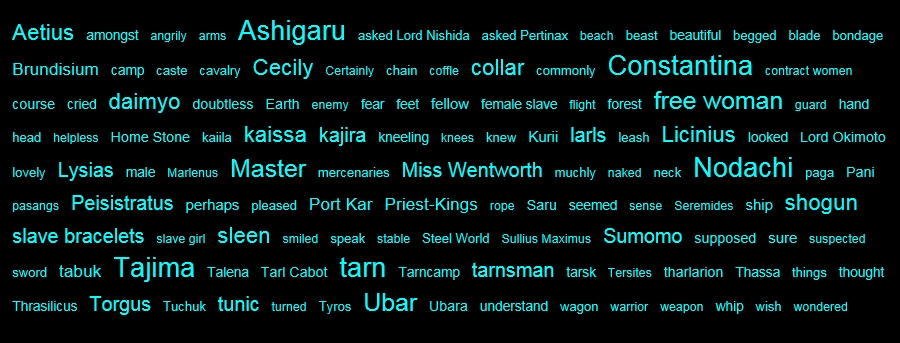


|
| ||
|
|
|
|
|
|
SILVER EDITION

|


|
SILVER EDITION |
|
Publication History
Cover Overview |
Reviews and Previews
Chapter Overview |
Word Cloud
[NEW]
First Chapter Preview [NEW] |
Cover Gallery (year)
Cover Gallery (edition) |
 Cover Overview
Cover Overview



 Reviews
Reviews Chapter Overview
Chapter OverviewHere is an overview of the 44 chapters in Swordsmen of Gor:
|
1. What Occurred at the Edge of the Forest
2. Pertinax; A Vessel Will Not Beach 3. We Sup with Pertinax; Constantina 4. A Sail 5. An Old Acquaintance is Renewed; A New Ship Arrives, and Discharges Passengers and Cargo; I Obtain Considerable Intelligence, But Not Enough 6. We Trek the Forest 7. We Reach a Reserve; The Signs Vanish; We Will Wait 8. Tajima; A Woman of Earth is to be Presented to Lord Nishida 9. The Thatched Hut; Three Tubs 10. In Which is Recounted a Portion 11. Cecily and I Look In on the Former Miss Wentworth 12. The Plaza of Training 13. I Seek Information in the Slave House 14. Tajima and I Hold Converse 15. I Have Purchased a Slave for Pertinax; I Learn Something of the Lessons of Pertinax 16. The Exercise; What Followed the Exercise 17. The Battle 18. Fighting Continues; We Report to Lord Nishida; The Stable 19. At the Stable 20. What Occurred Within the Stable; A Tarn is Requested 21. Licinius Lysias Takes his Departure from Tarncamp 22. Licinius Lysias Has Returned to Tarncamp; I Choose to Deal with Licinius Lysias in a Certain Manner; Saru is to be Taken from the Stable; I Return to my Hut, Followed Later by Pertinax |
23. The Feast; Some Leave the Feast Early
24. In the Tent of Lord Nishida 25. A Lantern Will Fail to Convey its Signal in Due Course; I Am Invited to an Interview 26. What Occurred in an Interview 27. Tarncamp is Abandoned 28. In the Forest, Its Miseries; A Talena; I am Attacked; A Sleen is in the Vicinity 29. We Emerge from the Forest 30. I Speak with Aëtius 31. I Hear of the Selections 32. The Selections 33. I Hold Converse with Lord Nishida 34. In the Shed, Which is Our Quarters 35. What Occurred in the Pavillion of Lord Okimoto 36. The Pyre 37. The Ship is to Sail 38. The Destruction of the River Camp; Unexpected Cargo is Boarded; The Ship Begins Her Journey 39. A Report is Received; Enemies are Discussed 40. That Which Occurred at the Mouth of the Alexandra; The Ship of Tersites Has Entered Upon Thassa; The Salute 41. We Are Pursued; This is Noted by Two Mariners 42. I Renew an Acquaintance 43. The Recruit 44. I Use a Slave; I Walk the Deck Alone; The Sea is Beautiful; The Ship Proceeds Apace |
 Word Cloud
Word CloudThe image below shows the most often used words and terms within Swordsmen of Gor. The larger the size, the more often the word or term occurs in the text.

 First Chapter Preview
First Chapter Preview
Chapter One
What Occurred at the Edge of the Forest
“I had not dreamed it so,” she said. “How could it be so beautiful?”
She stood on the beach, Thassa, calm, the sea, before her, the forest behind her.
We watched the ship of Peisistratus ascending, almost vertically, and then vanishing, far off, a sparkle, in the bright, blue sky.
“You had seen only Earth,” I said, recalling that distant, desecrated, half-ruined world from my past, “and the Steel World, once ruled by Agamemnon.” The name ‘Agamemnon’ was not the actual name of he who was once a Steel-World master, but it was chosen, it seems, for obscure associations. In any event, the actual name, being in Kur, could not be well rendered into phonemes accessible to the human throat.
In any event, we need not concern ourselves with Agamemnon as he had been dethroned, removed from the Steel World in question, and brought to Gor by exiled, devoted liegemen. Too, without a body, he was little to be feared.
The Steel Worlds are not visible to the naked eye, nor even to relatively sophisticated telescopic instrumentation. Too, they lurk, like wolves, muchly concealed, amongst the scattered stones, some small, many mighty, of what, on Earth, is commonly referred to as the asteroid belt, on Gor, by those familiar with the Second Knowledge, as the reefs of space.
Ramar, the sleen, lame, rubbed against my thigh.
“You can live in this place,” I told him. “I do not even know where we are.”
To be sure, I knew we were somewhere in the vicinity of the northern forests, north of the Tamber gulf, east of Thassa, well south of Torvaldsland. This mode of orientation is not Gorean, the common compass of which, with its eight cardinal points, is oriented to the Sardar, the dark, walled, mountainous abode of Priest-Kings, but founded on the Gorean poles. I am utilizing this manner of speaking, as it seems to me not only convenient but suitable. Should this record, then, which is written in English, and will thus be unintelligible to most Goreans, this often a boon to the writer, assuring as it does a modicum of privacy, indeed, it commonly amongst Goreans counting as a suspect, secret writing, come into the hands of any who might be familiar with English, these directions will be reasonably well understood. I write in English because it is easiest for me. Although I speak Gorean fluently, I can read it and write it only with difficulty. This is not unusual with those of my caste, many of whom, by choice, are contemptuously, pridefully illiterate, holding themselves superior to what they despise as trivial, vulgar learning. The business of their caste, then, in their view, is not with the pen but with steel, not with ink, but blood. Let scribes, they say, be adept with letters, and such, for that is their business, little scratches and marks on scrolls, and such. But this is not for them, not for the Scarlet Caste. But, too, should not each caste concern itself with its own business, the metal worker with metals, the peasant with the soil, the mariner with the sea, and so on? I do not commend this view, but report it. Too, in all honesty, it is not that unusual to find refined, literate members of my caste. Some members of my caste are educated gentlemen, educated, distinguished, dangerous gentlemen. Gorean, incidentally, is written “as the bosk plows,” which requires an alternating laterality, the first line read from left to right, the second from right to left, and so on. I might also mention that certain measures, of, say, length and weight, and such, will be approximated in English, in terms of pounds, yards, inches, and such, rather than in terms of stones, paces, horts, and such. The Gorean pace is very close to the English yard, but the stone is well over a pound and the hort is somewhat longer than an inch. I think this way of doing things will be helpful to an English reader. An exception, though perhaps not the only one, is the “pasang,” a convenient, often-encountered linear measure, easily graspable, I think. It is, as nearly as I can determine, having paced it out long ago, between pasang stones in the vicinity of Ko-ro-ba, some seven tenths of an English mile.
“The air,” she said, “exhilarates me!”
“The air has not been fouled,” I said. “Goreans love their world.”
“It is all so beautiful,” she breathed, wonderingly.
“Earth,” I said, “was doubtless once much like this.”
“The gravity,” she said, “is much like that of the Steel World.”
“It should be identical,” I said. “The rotation of the Steel Worlds, which produces their surrogate gravity, is arranged to simulate that of Gor.”
“There is a purpose in that?” she said, uneasily.
“Certainly,” I said. “The Kurii want Gor. Would you not want Gor, as well?”
“Given the fall of Agamemnon,” she said, “Gor has nothing to fear.”
“That is false,” I said. “Agamemnon wished to act unilaterally, and have Gor for himself. Many others, and even many in his own world, found that ambition unacceptable, or, at least, unrealistic. The denizens of the Steel Worlds, on the whole, wish to obtain Gor cooperatively, and, after that, they can dispute it amongst themselves.”
“And would?”
“Of course,” I said. “They are Kur.”
“I suppose humans might, as well,” she said.
“That explains much of the history of Earth,” I said, “competition for territory, resources, and such.”
“And women?” she said.
“Certainly,” I said, “women are highly desirable resources.”
“As loot, as properties, and slaves,” she said.
“Of course,” I said. “They are always valuable, as counters of wealth, and such.”
“And, one supposes, as helpless, vulnerable vessels of pleasure,” she said.
“Yes,” I said, “as helpless, vulnerable vessels of pleasure, vessels of inordinate pleasure.”
“As animals, whom you use as you wish?” she said.
“Of course,” I said.
“Men are beasts,” she said.
“They are what they are,” I said. “And on Gor they do not pretend to be what they are not.”
Her hand went, inadvertently, not really thinking much about it, to her throat. She could not remove the light, flat, slender metal band which encircled it, attractively, closely.
“Gor is lovely,” I said.
“Yes,” she said, looking out, over the sea.
“Sometimes the Priest-Kings,” I said, “as a most cruel punishment, condemn an individual to Earth.”
“Condemn?”
“Precisely.”
“Those of Earth are unaware of the nature of their world,” she said.
“They do not much mind it,” I said, “for they have known nothing else, nothing better. But the poor man, or woman, who is sent to Earth from Gor, they well understand the harshness of their sentence.”
“I suppose they, their lesson learned, must hope in time for mercy, a pardon, a reprieve?” she said.
“Some are sentenced for life,” I said.
“I am much pleased to be here,” she said.
“Even as you are?” I asked.
“Certainly,” she said.
She was well legged, sweetly hipped, narrow waisted, and well breasted. I did not think she would need be disappointed at the price that would be likely to take her off the block.
She was the sort of woman who was eminently purchasable.
The block was designed with such as she in mind.
“Even as what you are?”
“Oh, yes,” she said. “Yes! Yes! Extremely so! And particularly and appropriately so!”
“It is right for you?”
“Yes, and perfectly so!” she said.
“Perfectly so?”
“Yes, absolutely, perfectly so!”
“On Earth you did not anticipate it,” I said.
“Certainly not,” she said, “though I now realize how pathetically, and needfully, half consciously, sometimes fully consciously, I longed for it.”
“I see,” I said.
“I did not realize then what it was, what it would be, to be overwhelmed, owned, and mastered.”
“You are content?” I said.
“Yes,” she said, “joyfully so.”
“But it does not matter,” I said, “one way or the other.”
“No,” she said, “I know that. It does not matter, one way or the other.”
I looked out to sea.
No sails were seen.
The horizon was clear.
“You, and others,” she said, “fought against Agamemnon, furthering the ends of other Kurii, those opposed to him. Are not you, then, and your colleagues, friends, allies, with them?”
“For a moment, we were,” I said. “It was a brief intersection of interests, a moment when we traveled a single road.”
“And that road has forked?” she said.
“I think so,” I said. “Kurii are intent, and steadfast.”
“But we have been brought here, and put here, alive.”
“Doubtless in virtue of an arrangement with Priest-Kings,” I said.
“Who are Priest-Kings?” she asked. “What are Priest-Kings?”
“Do not concern yourself with the matter,” I said.
“Curiosity,” she said, “is not for one such as I?”
“No,” I said. “Such as you are for other things.”
“‘Other things’?” she said.
“Certainly,” I said.
“I can no longer see the ship of Peisistratus,” she said, looking after the path of the ship, shading her eyes.
“I gather it is to make landfall within territories under the hegemony of Ar, and there disembark the Lady Bina and her cohort, and guard, Lord Grendel.”
“To what purpose?”
“I know not,” I said.
“She expects to become a Ubara,” she said.
“She is clever, and beautiful,” I said, “but the thought is madness.”
“But she was put there, with her guard, Lord Grendel. Do you think this is a guerdon for obscure services she rendered, or a gift to Lord Grendel?”
“It seems unlikely,” I said.
“If you have been placed here, in this verdant wilderness, at the will of Priest-Kings, whoever or whatever they may be, might not the Lady Bina and Lord Grendel have their purposes, as well?”
“I do not know.”
“Why have you been put here?”
“I do not know,” I said.
“I see nothing about,” she said.
“Nor I,” I said.
“You have your bow, some arrows, a sword, a knife,” she said.
“Rejoice,” I said, looking about.
“It does not seem we were put here to perish,” she said.
“No,” I said, looking back to the forest, “but we may perish.”
“There are animals?” she said.
“Doubtless,” I said.
“Men?” she asked.
“One does not know,” I said.
“We have some provisions,” she said, “bread, a bota of ka-la-na.”
“I will hunt,” I said. “We will seek water.”
“When Peisistratus disembarks Bina—” she said.
“Lady Bina,” I said, sharply, narrowly.
“Yes,” she said, quickly, “Lady Bina.”
I wondered if she were testing me. That would have been unwise on her part. No love was lost between her and the beauteous Lady Bina, but that was no excuse for an impropriety in this matter, however inadvertent or slight. There were forms to be observed. Too, a chasm, a world, separated her from the Lady Bina. The gulf between a tarsk and a Ubara was less than the gap between one such as she and one such as the Lady Bina. To be sure, I had often thought that the Lady Bina would herself look quite well in a collar.
How did she expect to become a Ubara?
She did not even have a Home Stone.
And there was a Ubara in Ar, if only a Cosian puppet on the throne, Talena, a traitress to her Home Stone, Talena, once the daughter of the great Ubar, Marlenus of Ar, whose whereabouts, as far as I knew, were unknown.
“When Peisistratus disembarks the Lady Bina and Lord Grendel,” she said, “whence then he?”
“He will undoubtedly continue his work,” I said. I did not elaborate on the nature of his work, but she was substantially familiar with it. Peisistratus, and his crews, were in their way mariners and merchants. He doubtless had one or more bases, or ports, on Earth, and one or more on Gor, and I knew he had one on the Steel World from which we had been brought, that now under the governance of Arcesilaus, now theocrat of that world, and now, claimedly, Twelfth Face of the Nameless One.
“He is a slaver,” she said.
“He doubtless deals in various commodities, in various forms of merchandise,” I said.
“He is a slaver,” she said.
“Yes,” I said, “certainly at least that.”
“Predominantly that,” she said.
“Perhaps,” I said. “I do not know.”
“I saw the capsules on the ship,” she said.
“He is a slaver, certainly,” I said.
“Perhaps he thinks he is rescuing women from the ravages of Earth,” she said.
“That seems unlikely,” I said.
“At a price, of course,” she said.
“Oh?” I said.
“A rag, if that, and a mark, a collar,” she said.
“I doubt that his motivations are so benevolent, so thoughtful,” I said, “even mixedly so. And, on the other hand, his motivations are certainly not villainous, or malevolent. Do not think so. You know him too well for that. I think of him primarily as a business man, obtaining, transporting, and selling, usually wholesale, wares of interest.”
“Women,” she said.
“Perhaps an occasional silk slave, to delight a free woman,” I said.
“Mostly women,” she said.
“Almost always,” I said.
“They sell better,” she said.
“Of course,” I said. “They are the most fitting, appropriate, and natural form of such merchandise.”
“‘Merchandise’?” she said.
“Yes,” I said.
“Goods?”
“Of course.”
“They view us as animals, as cattle,” she said.
“There is nothing personal in it, or usually not,” I said. “To be sure, one might take a particular female who has displeased one, in one fashion or another, and have her brought to Gor, to keep her, or see her sold off to the highest bidder, that sort of thing.”
“As cattle!” she said.
“No,” I said, “as less, as females.”
“It seems I have an identity, and a value,” she said.
“Certainly,” I said.
“But I was not brought to the Prison Moon by him, or by one such as he,” she said.
“No,” I said. “But do not be distressed, for he assured you that you would have been well worthy of selection and transportation, that you were exactly the sort of goods which would have been well enclosed, so to speak, in one of the capsules.”
I had found myself, months ago, imprisoned in a container on the Prison Moon, sharing the container with two individuals, a young Englishwoman, Miss Virginia Cecily Jean Pym, and a lovely Kur Pet, who had later come to be the Lady Bina. These were both free women and I, who had seemingly displeased Priest-Kings had been, apparently, enclosed with them as an insidious punishment, that, sooner or later, as I weakened, becoming more bitter, frustrated, outraged, and needful, my honor would be compromised, or lost. And, after that, I do not know what fate they might have planned for me, perhaps a hideous death, perhaps a wandering life of exile, beggary, and shame. One does not know. Both were, at the time, though without Home Stones, yet free women, you see, and thus, given the nobility of their status, not to be lightly put to one’s pleasure, certainly not without suitable provocation. It is difficult to convey the dignity, importance, and social standing of the Gorean free woman to one with no first-hand awareness of the matter. They have a position and elevation in society which far transcends that of, say, the free woman of Earth who is usually not so much free as merely not yet enslaved. The analogy is imperfect but suppose a society of rigid status, of severe hierarchy, and the rank and dignity that might be attached to the daughter of, say, a royal or noble house. One in such a society would not be likely to think of bedding such an individual, at least as a serious project. To be sure, a Goth, a Turk, a Saracen, a Dane might have fewer inhibitions in such a matter.
Kurii had raided the Prison Moon, freed me, and brought me to what was then the Steel World of Agamemnon.
But this event and various ensuing events, as I understand it, have been elsewhere chronicled.
“What are you doing?” she asked.
“Ramar,” I said, “must be freed.”
“Is that wise?” she asked.
“I do not know,” I said. “But it was for this reason that I had him brought to Gor.”
I had first seen Ramar in an arena on the Steel World, a milieu in which his ferocity, might, and cunning, in virtue of dozens of bloody victories, were renowned. Bred for dark sports, trained to hunt and kill, he was a prize of his breed, a champion of his kind. Later, in the insurrection, he, and other sleen, as Agamemnon grew more desperate, uncertain, and frightened, had been freed, that they might hunt down, destroy, and devour his foes, in particular ill-armed humans who might be party to the rebellion. A Kur, unarmed, is a match for a sleen. A Kur, armed, has little to fear, unless taken unawares. In turn, the revolutionaries, primarily the rebel Kurii, primarily on behalf of their human allies, had set a number of heavy, metal traps, more than two-hundred pounds in weight, baited with haunches of tarsk, traps fastened by heavy chains to large stakes sunk deeply into the ground, and in one such trap this beautiful animal, this great, fierce, dangerous, six-legged, sinuous monster, Ramar, had been caught. In this trap, held by its steel teeth, clamped deeply into his left rear leg, to the bone, bleeding and tortured, jerking against the stake and chain, then quiescent and silent, he would have died, of prolonged pain, or thirst. He was a large, noble animal, and beautiful in the hideous way in which a sleen can be beautiful, and it did not please me that such a creature should perish so miserably. Doubtless unwisely, I managed, with great difficulty, to open the trap, and the beast, freed, withdrew, vanished, limping, into the brush. He had not attacked me. Perhaps it had not occurred to him to do so. Later, we had encountered one another now and again. I think some record of this is elsewhere available. Following the denouement of the insurrection on the Steel World in question and, seemingly, in virtue of some interaction or agreement between Priest-Kings and victorious Kurii, it was determined that I, and others, were to be returned to Gor. Might we have hoped that our labors on the Steel World had pleased, or, at least, appeased, Priest-Kings? Could such forms of life be mollified? And could they not then have been satisfied, at last, and have seen fit, in their wisdom, to free us from their interests? Certainly we had, or some of us, however unintentionally or inadvertently, served them. Surely they now had less to fear from one of the greatest and most dangerous of the Kurii, Lord Agamemnon, an ambitious, skilled, determined, brilliant, gifted, implacable foe. In any event I had not been slain, or returned to the horrors of the Prison Moon. I now found myself again on Gor. I had then little hope that Priest-Kings had finished with me, as I would have fervently desired. Had that been so should I not have been returned, liberated and thanked, perhaps even bountifully rewarded, to my holding in Port Kar? But I was here, somehow, on this remote beach, the forest behind me. In leaving the Steel World I had brought Ramar with me. He deserved, I thought, the woods or forests, the plains or mountains, the openness and freedom, of Gor, not the steel platings and inserted gardens, the contrived geography, of a Steel World. Let him live as a sleen, in a world fit for him. Indeed, let men live in worlds fit for them. Too many live in their own Steel Worlds, and know not this, know not their prisons.
“He will turn wild,” she said.
“He is wild,” I said.
“He will become dangerous,” she said.
“He is dangerous now,” I said.
I unbuckled the thick, spiked collar from the throat of the giant, lame sleen, Ramar, and pointed behind us, to the forest. The large, round eyes regarded me, as though quizzically.
“Yes,” I said, “friend. Go.”
A protestive growl emanated from the throat of the beast. It wound its body about me, moving, curling about me. I thrust the heavy body from me.
“Go,” I said, sternly. “Yes, it is my wish.”
“He does not want to go,” she said.
“Go,” said I, to the sleen.
I then, impulsively, knelt down and seized the massive body about the neck, and buried my face in the fur of his shoulder.
“You are crying,” she said.
“No,” I said.
I then stood, and wiped my eyes with the back of my forearm.
“You are crying,” she said.
I scorned to respond to so foolish an allegation.
Ramar whimpered.
“The forest is there!” I said to him, turning his head with my hand toward the forest. “That is your world!” I said, pointing. “Go! Go!”
I watched the sleen take its leave, its left, hind foot marking the sand, where he dragged it behind him.
Then he was gone.
I then turned to regard her.
“Wipe the tears from your cheek,” I told her.
She obeyed.
To be sure, emotion is acceptable for women, and certainly for such as she, the sort which, though the least, is the most female of all women.
She had been one of the two women who had been enclosed with me in the small, transparent container on the Prison Moon, two who had been deliberately, carefully selected by Priest-Kings, with all their shrewdness and science, with all their malevolent expertise, to constitute exquisite temptations for me, who were intended to be such as would prove irresistible to me, either of them a suitable engine to accomplish in time the destruction of my honor, either one of which was a banquet to lure me, tormented and starving, inevitably, sooner or later, from the rigors of my codes.
I regarded her.
She who had become the Lady Bina had been, at that time, long ago, in the container, no more than a Kur pet, a human pet of a superior life form, the Kurii, one at that time not even speeched, one at that time no more than a simple, naive, luscious, appetitious little animal. Surely the little beast was exquisitely desirable, who could deny that, but even then the other, the dark-haired captive, the English girl, Miss Virginia Cecily Jean Pym, clearly the product of a pathological culture, inhibited, unpleasant, arrogant, nasty, with such clearly ambivalent feelings toward men, even hostility toward males, was the one on whom I most wished to lay my hands, she whom I most desired to seize and subdue, whom I thought it would be most amusing to have in my arms, and force to buck and squirm, and whimper and plead, and cry out and beg, and weep in my arms her helpless, unconditioned, grateful, rapturous submission, that of the shattered, devastated, begging female to the will of the possessive, uncompromising, owning male. I do not think that she was objectively superior to the Kur pet, and might even have brought a lower price than the Kur pet in most markets, but she was somehow very special to me. Indeed, I have little doubt that she had been selected for me, with great care and skill, perhaps from amongst thousands, that she had been matched expertly to my inclinations, preferences, and needs, inclinations, preferences, and needs of which I might not even have been aware. Two other factors, too, I suspect, were involved. As she had been matched to me, I suspect that I had been matched to her, as well. The Priest-Kings, I suspect, had, so to speak, fitted us together. Had she no need of such as I, the temptation would have been primarily mine, and it would have failed of its devastating symmetricality. But I, so desiring her, how helpless I would have been, had she been, sooner or later, similarly distressed and tormented. How could we have then failed to embrace, and therewith comply with the will and intrigues of Priest-Kings?
Do they not use us as their pawns, their dupes, and instruments? Using our congruent natures how could we, so subtly manipulated, have failed to dance upon their strings?
The other factor involved was one I sensed early, the deep nature of the lovely English female, but had confirmed only after the rupturing of the Prison Moon, after the destruction and melting of a steel gate, and the opening of the container, these events implicated in the Kur raid, in their hurried, transitory seizure of an artificial moon, or a portion thereof, in that fearful traversing of forbidden borders, an act of perhaps unwise transgression, the fruit perhaps of a strange wager, one in which the winnings, seemingly the liberation of a single, imprisoned warrior, and one commonly their foe, would seem small, put against the risks of loss, the possible retribution and reprisal of Priest-Kings, masters of Gor and her space.
Surely much was rushed for time was short.
Presumably within Ehn, so shortly, the ships of Priest-Kings might come to investigate, to succor, to retaliate, to recover their threatened, violated sphere, the Prison Moon.
Squirming in terror on the flooring outside the container, on its metal plating, amongst the clawed feet of Kur raiders, fearing to be destroyed, even eaten, by what to her were fierce and incomprehensible beasts, she had cried out “Masters!”
This had surprised me.
I had been startled, though I had sensed even in the container something of the deep nature, the hidden reality, of the lovely, petty, snobbish, supercilious Miss Pym.
Who knows the secret thoughts locked in the diary of a woman’s dreams? And how few of them would dare to open the pages of that intimate journal to a stranger’s perusal.
How tragically alone such women are!
And how natural it is that they should fear, at first, not to be alone!
Many fear even to speak to themselves, let alone another.
In her extremity, her elections of certain utterances were, of course, not to be unexpected in a female.
They are common in the history of worlds.
What have they to bargain with, save their beauty?
And will it be enough?
Is it sufficient? Is it enough that they will be spared, to be brought, perhaps rather sooner than later, to the sales block?
But such a cry was to be expected, not only in any woman at the feet of males, but particularly from one such as she, who, in a thousand ways, I discerned, sensed the fittingness of her position, her prostration.
Had she not been so, in one way or another, in her dreams, on the smooth, scarlet tiles of a conqueror’s palace, on the deep-piled rug within the tent of a desert chieftain, on the deck of a pirate’s vessel?
In a pathological culture, of course, many things are kept concealed, often those which are most illuminating and meaningful, most important.
She had shortly thereafter explicitly proposed herself as a slave, indeed had pathetically begged bondage. Indeed, a moment later, she had clearly, explicitly, pronounced herself slave.
These words, “I am a slave,” were cried out in full consciousness. They came from the subterranean depths of her, as a quaking, helpless, unexpected eruption of truth from the volcano of her being.
What a moment of release, of emotion, that must have been for her!
In that moment she had grasped her womanhood, only, to be sure, to soon desire to repudiate it, again.
But it was too late.
With those words, she had, by her own deed, become a slave.
And such words cannot be unspoken.
It is done.
She is then helpless to qualify, reduce, diminish, or revoke the words, for she is then a slave.
All that remains is that she be claimed.
That had been done later, weeks later, in the Pleasure Cylinder, a small adjunct or auxiliary world to the Steel World at that time ruled by Agamemnon, Theocrat of the World, Eleventh Face of the Nameless One. Three other such related worlds were the Hunting World, used for Kur sport, the Industrial World, in which its manufacturing was accomplished, and the Agricultural World, in which a variety of crops were raised under controlled conditions, largely by automation. Kurii are naturally carnivorous, but in the limited environments of the Steel Worlds a number of processed foods have been developed, with which they may be nourished. Humans, and other animals, too, of course, were commonly raised for food. Following the services of a number of human allies in the rebellion, however, humans are no longer eaten in the Steel World in question, and, I understand, in certain of the others. The “cattle humans” who were raised specifically for meat are herded about and cared for, or relocated, but no longer eaten. It is supposed they will eventually disappear as they are large, clumsy, lumbering beasts disinclined to mate. Their numbers in the past were increased by means of artificial insemination. The ships of Peisistratus, incidentally, were docked within the Pleasure Cylinder. It was from one of its locks that his ship had exited, and sped to Gor.
“Ramar is gone,” she said, looking toward the forest.
“Yes,” I said.
“You freed him,” she said.
“Of course,” I said. “He should be free.”
“Should I not be free?” she asked.
“No,” I said.
“I do not mind being as I am,” she said.
“It does not matter whether you do or not,” I said.
“I see,” she said. “My will is nothing.”
“Precisely,” I said.
“You would keep me as I am?”
“Of course.”
“Why?” she asked.
“You are a female,” I said.
“Many females are free,” she said.
“True,” I said.
“Do you think that women should be slaves?”
“The most desirable ones, of course,” I said. “They are of the most interest. The others do not matter.”
“I have heard that Goreans believe all women should be slaves,” she said.
“You could probably find a Gorean free woman who does not accept that, but then she has not been in the collar.”
“If she were in the collar, she would change her mind?”
“If she were in the collar,” I said, “it does not matter whether she changed her mind or not.”
“She would still be in the collar.”
“Of course.”
“I suppose that Gorean men,” she said, “believe all women should be slaves.”
“I would not know what all Gorean men believe,” I said, “but many Gorean men believe that all women are slaves, only that not all of them are in collars, as they should be.”
“I see,” she said.
I looked upon her, as one such as she may be looked upon.
She straightened her body.
“Shall I strip and assume inspection position?” she inquired.
I did not respond to her. I recalled she had earlier referred to the Lady Bina, but had omitted her title, as “Lady.” That title is given only to free women, unless it might be, in virtue of its inappropriateness, bestowed in such a way as to terrify one such as she.
In inspection position one such as she would normally be stripped, and standing with her feet spread, and her hands clasped either behind the back of her neck, or behind her head. In this way the breasts are lifted nicely, and, given the position of the hands, one has no interference to one’s vision, and, similarly, one may, perhaps walking about her, test her for firmness, and for vitality, and such things. Teeth are often examined, as well. A barbarian girl, brought from Earth, often can be told from fillings in the teeth. Another common mark is a vaccination mark, usually thought by Goreans to be an Earth brand. Goreans prefer, of course, Gorean brands, which are commonly clear, tasteful, unmistakable, and beautiful.
“You are no longer on the Steel World,” I said. “Here is a planet, with openness. You are not now encircled with curving walls of steel. Perhaps you think things will be different for you here.”
“Doubtless in some respects,” she said.
“Essentially?”
“I do not know,” she said.
“They will not be,” I said. “This is Gor.”
“I wear a collar,” she said.
“Precisely,” I said.
“Collar!” I snapped.
Instantly she faced me, holding her hands slightly behind her, and lifted her chin.
She had received, I saw, some training in the Pleasure Cylinder. This would have occurred before she had been claimed.
It was appropriate, of course, that she should have been apprised of such things, or several such things, even before her claiming.
In such a way, in so simple a manner, may be precluded various instructions with the leather.
In this position the collar may be conveniently read.
I held the collar with two hands.
“What does the collar say?” I asked.
“I cannot read,” she said. “I am told it says ‘I am the property of Tarl Cabot.’”
“That is correct,” I informed her. “Who am I?”
“Tarl Cabot,” she said.
“Then whose property are you?” I asked.
“Yours,” she said, “—Master.”
“You are a slave,” I said.
“Am I?” she asked.
“Yes,” I said.
“Even here?” she said.
“Yes,” I said.
“Do you wish to be freed?” I asked.
“There is nowhere to go,” she said. “I could not live.”
“Do you wish to be freed?” I repeated.
“No,” she said.
“Why not?”
“I beg not to be made to speak,” she said.
“You are clad as a slave,” I said.
“Yes,” she said.
She wore a Gorean slave tunic.
It was a brief, gray shipping tunic, from the ship of Peisistratus. It had a number inscribed on the upper left side, “27.” This number, as others, had been correlated with the numbers of a set of chaining rings, number 1 with ring 1, and so on. She with others of her sort had thus been chained in an orderly fashion, serially, in one of the ship’s corridors. By means of the numbers a girl, if removed from her chaining ring, can be returned to the same ring. Order, discipline, and precision are important in the closed environment of a ship. I had removed her from her ring several times during the voyage. The Lady Bina, on the other hand, had been accorded quarters, as she had insisted, in the cabin of Peisistratus himself, the captain, who then, with her guard, Grendel, had bunked with his men. It must not be thought surprising that the Lady Bina had been deferred to, for she was a free woman.
The girl before me was fetching in the shipping tunic, but that was not surprising as such tunics, even such as hers, a shipping tunic, are not designed to conceal the charms of their occupant.
The Gorean slave tunic, incidentally, is a form of garment with several purposes. In its revealing brevity and lightness it well marks the difference between the slave and the free woman, a difference of great consequence on Gor. From the point of view of the free woman it supposedly humiliates and degrades the slave, reminding her of her worthlessness, and that she can be bought and sold, that she is no more than a domestic animal, an article of goods, and such. The slave, on the other hand, as she grows accustomed to her status, and its remarkable value in the eyes of men, tends to revel in its enhancement of her charms, a pleasure which is likely to be seriously begrudged her by the more heavily clad free woman. Few women, of course, object to being found appealing, even excruciatingly desirable, by males. Do not even free women sometimes inadvertently disarrange their veils? So, many slaves, at least in the absence of free women, before whom they are likely to grovel and cower, and wisely, to avoid being beaten, luxuriate and rejoice in their beauty and its display. A slave tunic, you see, leaves little to the imagination. Other advantages, too, adhere to such garments. For example, as they commonly lack a nether closure, with the exception of the Turian camisk, the slave is constantly, implicitly, advised of her delicious vulnerability as a property, and reminded of one of her major concerns, which is to please the master, instantly and without question, to the best of her ability, in any way he may wish. The slave, on her part, too, cannot help but find such garments arousing. In their way they serve to ignite and stoke the slave fires in her lovely belly. It is no wonder slaves often find themselves at the feet of their master, kneeling, and begging. Too, such garments are supposed to make it difficult to conceal weapons. There is no place in such a garment, for example, for a dagger. To be sure, it can be a capital offense for a slave to touch a weapon without a free person’s permission, so there is little danger of the slave’s attempting to conceal a weapon in the first place. But the garment, too, makes it difficult, or impossible, to conceal a roll, a purloined larma, or such. When the slave shops, if she is permitted to use her hands, and is not sent out back-braceleted with a coin sack tied about her neck, she commonly holds the coins clenched in her fist, or, not unoften, either, holds them in her mouth. Such garments are cheap, too, of course, and require little cloth. Too, many are designed with a disrobing loop, by means of which the garment may be easily removed, to be swept from her, or dropped, to fall about her ankles, depending on the garment. The loop is usually at the left shoulder, as most masters are right-handed.
She turned away from me.
“We are now out of the Steel World,” she said.
“So?” I said.
“You freed Ramar,” she said.
“Yes,” I said.
“Will you not now free me?” she asked.
“No,” I said. “Do not be absurd. You are not a sleen. You are nothing, only a human female.”
“And one who belongs in a collar?”
“Obviously,” I said.
“In your collar?”
“In a collar,” I said, “whomsoever’s it might be.”
“In any man’s?” she said.
“In some man’s,” I said.
“Yours?”
“Not necessarily,” I said, “but in some man’s collar.”
“I belong in a collar?”
“Of course,” I said.
“I gather,” she said, “that female slavery exists on this world?”
“That is true,” I said, “and male slavery, as well.”
“But most slaves are female, are they not?”
“Yes,” I said. “Slavery is a misfortune for the male, for the male, or most males, are naturally free, and master, but bondage is apt for the female.”
“Females are not the same as males?” she said.
“No,” I said. “They are quite different, profoundly, radically different.”
“The male is to own, and the female is to be owned?”
“The female, as a female,” I said, “can find her total fulfillment only in bondage, only at the feet of a powerful male, who will see her and treat her as the property she wishes to be, and nature intended her to be.”
“I see,” she said.
“It does not matter whether you do or not,” I said.
“I am in a collar.”
“Yes.”
She looked away.
“I suppose female bondage has a justification,” she said.
“Yes,” I said.
“Nature,” she said.
“Certainly,” I said. “Nature. Let her tell you of the rightfulness of your collar.”
She spun about, tears in her eyes. She clutched her collar. “She has told me!” she cried.
“I know,” I said.
“But we are no longer in the Steel World,” she said. “Here, surely, whether I will it or not, you will free me!”
“If you are testing me, trying my patience,” I said, “I do not care for it.”
“But we are alone,” she said. “You need not now, nor could you, continue to hold me in bondage!”
“Do you wish to be freed?” I asked.
“No,” she cried. “I do not wish to be free! But you must free me! You are not Gorean! You are of Earth, of Earth! You have no choice but to free me!”
“I do not understand,” I said. Did she not know she stood on the soil of Gor, and was collared?
“You must take me away from myself!” she sobbed. “You must rob me of myself!”
“I do not understand,” I said.
“You are of Earth, of Earth!” she said. You have no choice but to free me! You must free me!”
“You think so?” I asked.
“Certainly,” she wept.
“Certainly?” I inquired.
“Certainly,” she said.
“Remove your clothing,” I said, “and approach me, with your wrists crossed, before your body.”
“What?” she said.
“Now,” I said.
In a moment I lashed her wrists together before her body. I then drew her, stumbling, by the loose end of the strap to the edge of the forest. There I thrust her against a tree, belly against the bark, and flung the free end of the strap over a branch. “Master!” she cried. I then drew her crossed, bound hands up, high, unpleasantly so, over her head, and fastened them in place, that by means of the same strap, it now tied beneath the straps on her wrist.
“Master!” she wept.
She was stretched, on her tiptoes.
“You have not been pleasing,” I informed her.
“Forgive me, Master!” she cried.
I removed my belt.
In a moment I was through with her, but it had been enough.
“Do you think you will be freed?” I asked.
“No, Master!” she wept.
“Perhaps I will sell you,” I said. The former Miss Virginia Cecily Jean Pym had not been pleasing.
“Please do not sell me!” she begged.
I replaced my belt, freed her and turned away.
In moments she had followed me, and was on her belly on the pebbled sand, naked, sobbing, licking and kissing my feet, in piteous supplication.
“Do you think you will be freed?” I asked.
“No, Master!” she wept. “No, Master!”
“I am Gorean,” I said.
“Yes, Master!” she said.
“Do you understand that, Earth female?” I said. “You are owned—owned by a Gorean.”
“Yes, Master!” she said.
“Do you understand the meaning of that?”
“Yes, Master!” she said. “I am a slave, only a slave, and no more!”
“The most abject, worthless, and meaningless of slaves,” I said.
“Yes, Master!” she wept.
“What a miserable lot is yours,” I said, “that of helpless, abject bondage.”
“Yes, Master,” she said.
“Perhaps you understand better now the peril and degradation of your condition?”
“Yes, Master!”
“Do you still wish to be a slave?” I asked.
“Do not make me speak!” she begged.
“Speak,” I said.
“Yes, Master!” she sobbed. “Yes, Master!”
“Why?” I demanded.
“For then,” she said, “as a woman, I am wholly myself!”
“Do you think you will be kept as a slave for any reason of yours?” I asked. “Perhaps because you wish to be a slave?”
“Master?” she said.
“What you might wish is not only unimportant,” I said, “but meaningless, absurdly irrelevant.”
She looked up at me, from her belly, tears in her eyes.
“It is irrelevant,” I said, “whether or not you want to be a slave, or desire to be a slave, or need to be a slave.”
“Master?” she said.
“You will be kept as a slave,” I said, “because you are a slave, and should be a slave, and it pleases men that such as you should be owned.”
“Yes, Master,” she sobbed.
“Your will is nothing,” I said.
“Yes, Master,” she said.
“You were less than fully pleasing,” I informed her. “A slave is to be fully pleasing.”
“Yes, Master!” she wept.
“I think I will sell you,” I said.
“Please, no, Master!” she wept. “I will try to please you, Master, fully, Master, fully, fully, perfectly, in all ways! Please do not sell me, Master! Keep me, I beg you!”
“I will do as I wish,” I informed her.
“Yes, Master,” she wept.
“Perhaps you now better understand what it is to be a slave?”
“Yes, Master,” she whispered. “Yes, Master.”
She looked up at me, mine, her face run with tears.
I regarded her.
Her lips trembled with emotion.
Her face was sensitive, soft, and beautiful. It was nicely framed in glossy, dark hair, still a bit short, perhaps, but it would grow. Long hair, as is well known, is favored in such as she. Much may be done with it, aesthetically, and in the furs. Too, it might be noted, in passing, that the female was highly intelligent. That much improves a girl’s price. That would be important if I chose to sell her. Such women make the best slaves. They quickly learn what they now are. Too, compared to the more ordinary, or average, woman, they tend to be, at least initially, more in touch with, and more aware of, and more open to, their own deepest needs, and desires. They come into the collar, thus, half-prepared for bondage.
Gorean slavers do not bring stupid women to Gor. They do not sell well.
I looked down upon her.
I liked her as she was, at my feet, collared, naked.
She belonged there.
“Now,” I said, “we must welcome our visitor.”
She looked up at me, wildly.
“Clothe yourself, girl,” I said.
She scrambled on her knees to her discarded garment, hastily pulled it on, over her head, and turned, on her knees, to face the visitor.
She would remain kneeling until given permission to rise, as she was a slave in the presence of free men.
“Tal,” said the fellow, standing back, amidst the trees, in the shadows.
“Tal,” I rejoined.
 Cover Gallery (year)
Cover Gallery (year)Here is a cover gallery showing all the editions and printings of Swordsmen of Gor, sorted by year of publication. Click on any cover to see the book.









 Cover Gallery (edition)
Cover Gallery (edition)Here is a cover gallery showing all the editions and printings of Swordsmen of Gor, sorted by edition. Click on any cover to see the book.









 This page is copyright © 2000/2013 by Simon van Meygaarden & Jon Ard - All Rights Reserved
This page is copyright © 2000/2013 by Simon van Meygaarden & Jon Ard - All Rights Reserved